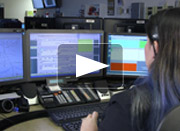Operational Communications Centre
Behind the Frontline:
911 Know your Role

Behind the Frontline:
911 Answer the Call

Before calling 911
- What is your location? Do you know the address or can you give driving instructions?
- Are you, or the person you are with, severely injured?
- Is this a life or death situation?
- Who is involved? Where are they? Are there weapons involved?
Remember
- Deactivated cell phones can still call 911. Remove the battery from old devices.
- Unregistered cell phones can still call 911. Geolocation data usually provides a 30 km search area.
- If you dial 911 in error, please remain on the line and do not hang up.
The Operational Communications Centre (OCC) provides critical operational support to RCMP officers in the field. The OCC is the first point of contact for the public requesting police assistance in both emergency and non-urgent matters. In Alberta there are two provincial OCCs: Edmonton and Red Deer. These centres provide support to 136 detachments and satellite offices throughout Alberta's RCMP communities including Alberta Sheriffs (traffic units) and various municipal police agencies, 24 hours a day, 365 days of the year.
Alberta OCCs receive an average of 2,500 calls a day; evenings and weekends being the busiest times. Operators receive calls, enter information in computer systems and evaluate what services are required. Dispatchers then send the information onto officers as quickly as possible, ensuring priority is placed on public and officer safety. To expedite calls, and to dispatch officers as quickly as possible, it is important for members of the public to have key information available when calling.
Location is an important piece of information when calling 911. Without an exact address or landmark, geolocation data from mobile devices can only provide a general location, usually only providing officers a 30 km radius of where the call is coming from. This can greatly increase the amount of time it takes for an officer to locate someone who maybe be in distress.
During regular business hours, 8 a.m. - 4 p.m. Monday to Friday, we request that you contact your local detachment for the following:
- Updates to current files
- Non-injury motor vehicle accidents
- Property crimes not in progress
- All other non-emergency situations
A career as an OCC telecommunications operator is an exceptionally rewarding career path within an organization that thrives on helping others. Telecommunications Operators are expected to make quick, responsible decisions in their role as the "lifeline" to the police officer in the field and to members of the public that are often caught in emergency situations. The RCMP offers an extensive training period to their OCC employees in both the classroom and on the job to ensure all operators have the experience, techniques and knowledge base to help make quick decisions. They graduate having successfully completed the National Telecommunication Operator Training and Field Coach programs. A telecommunications career is a rewarding profession completed by individuals that put public and community safety at the forefront every day of the year.
For information on joining our OCC team please visit Government of Canada jobs.
- Date modified: